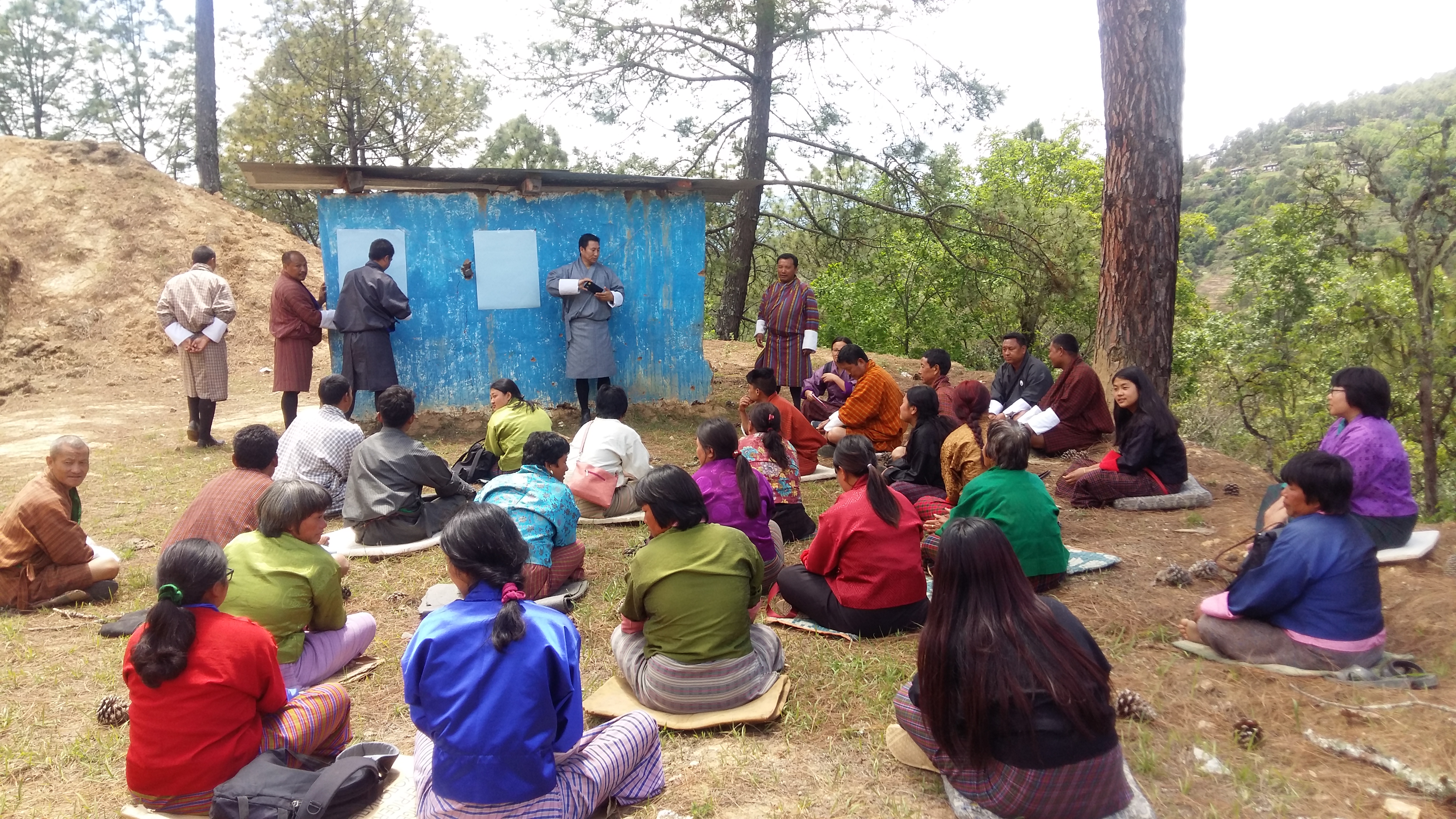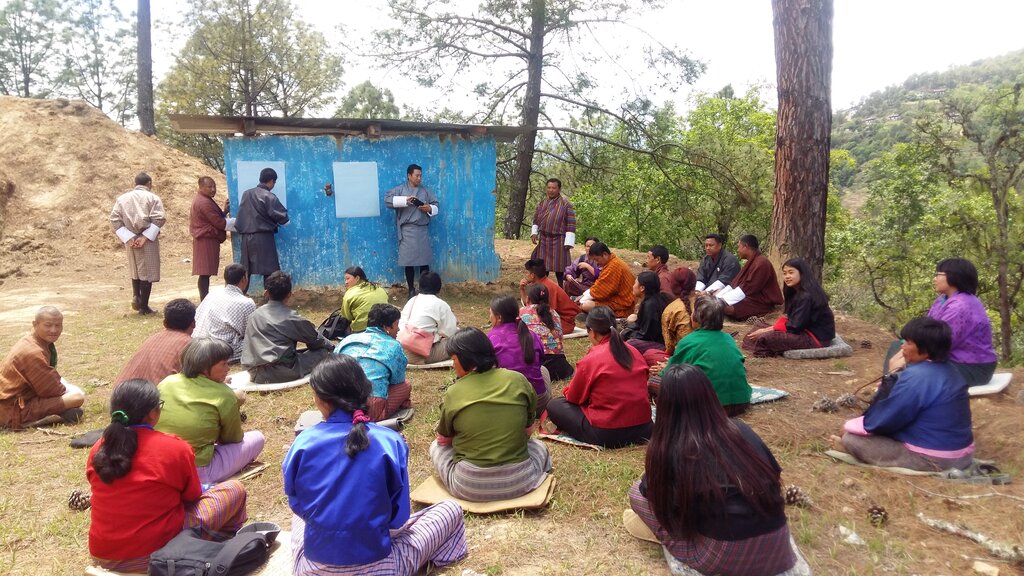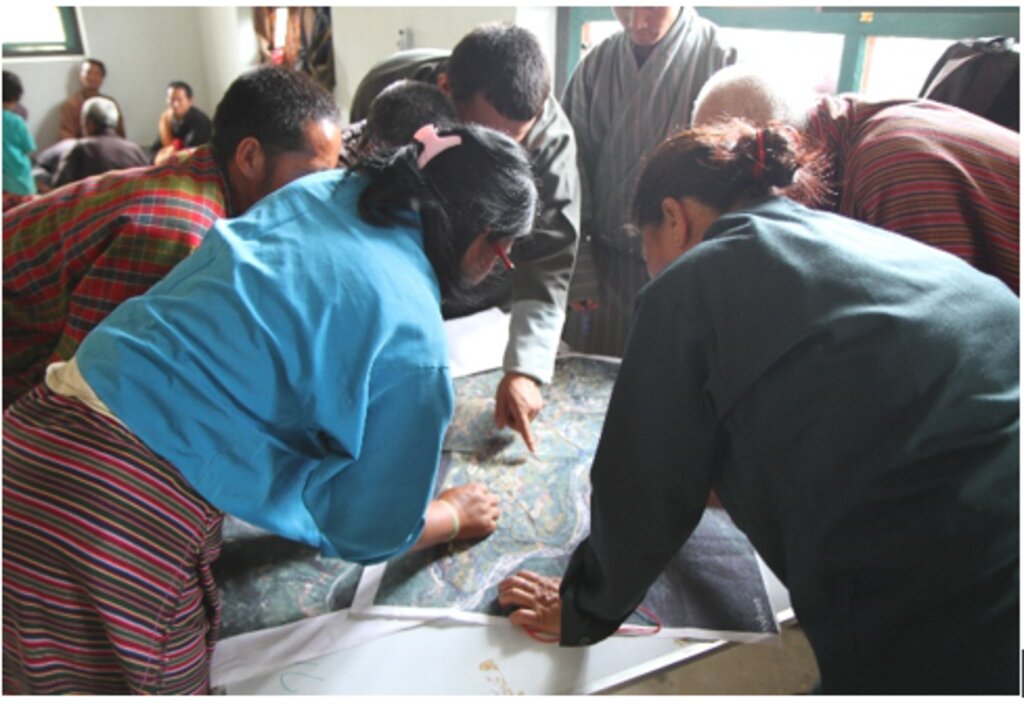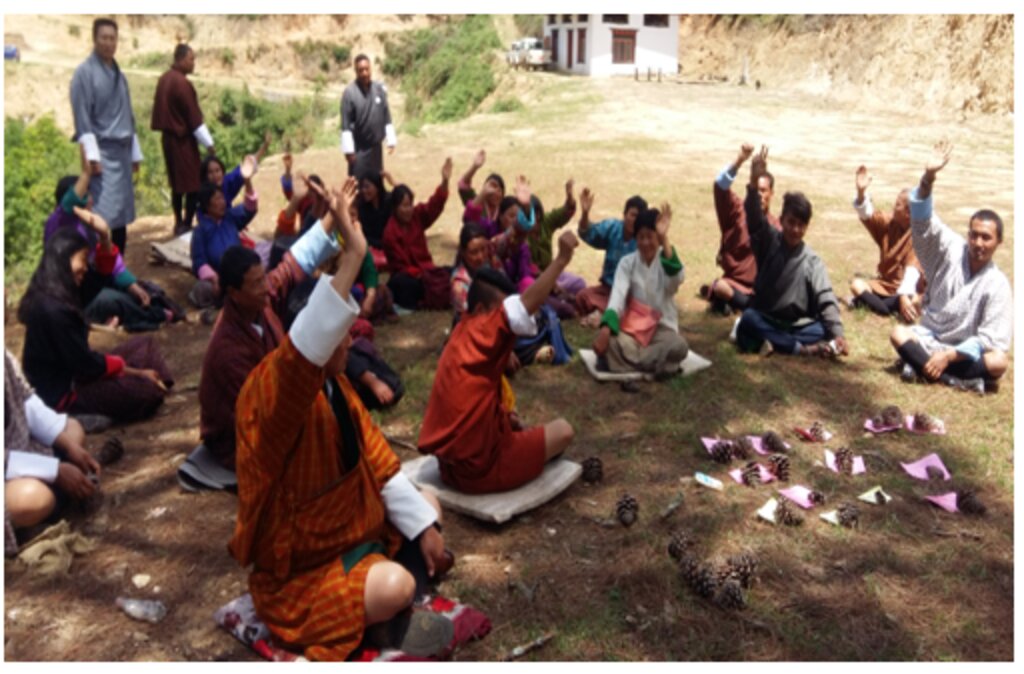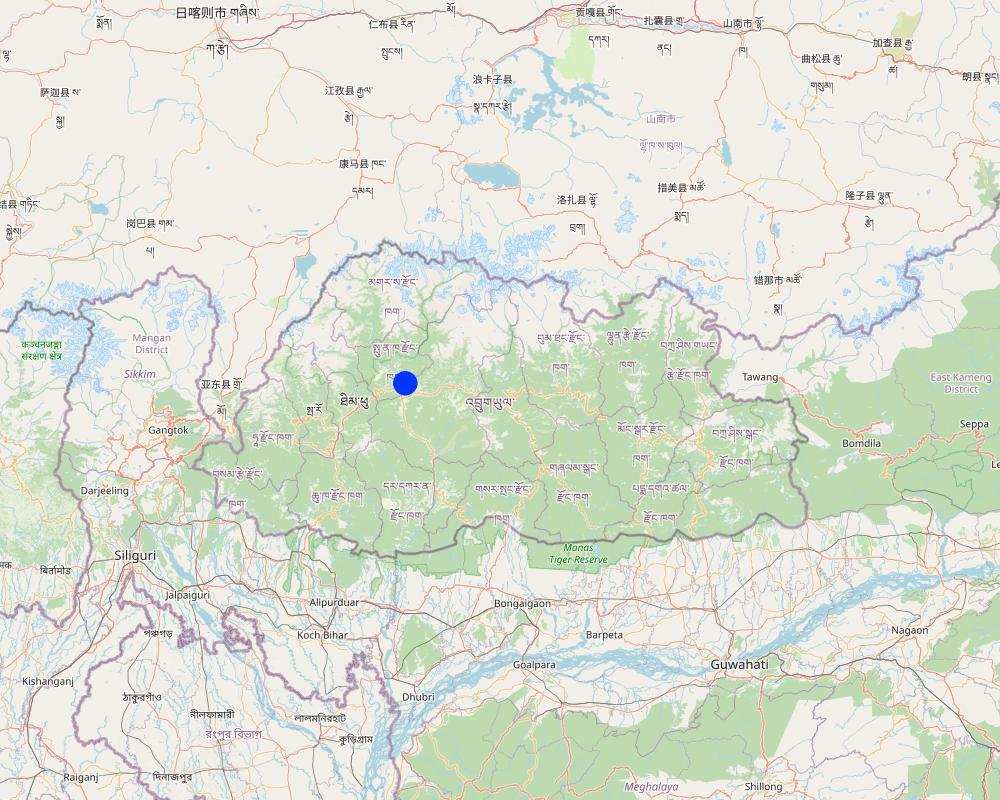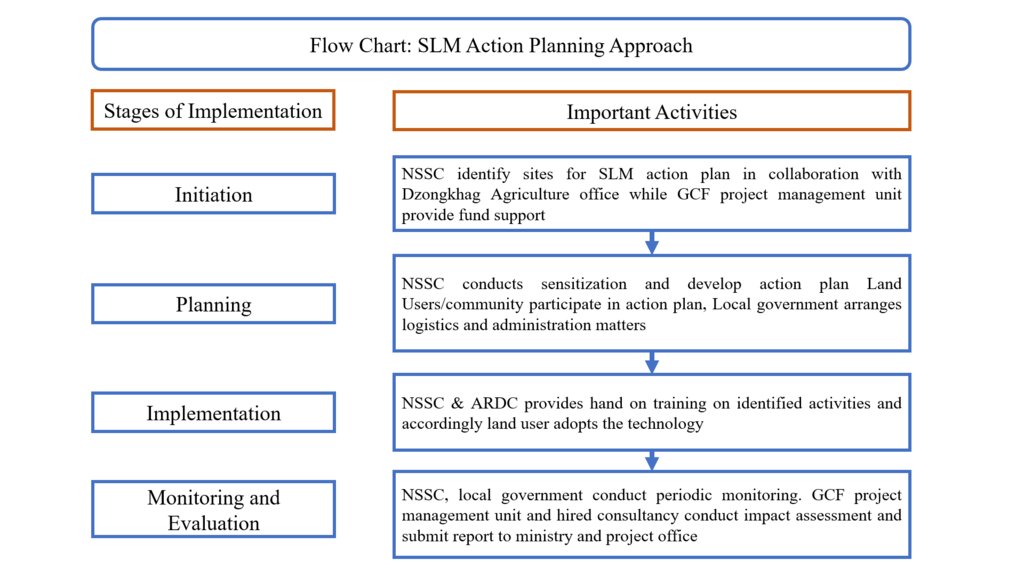Participatory SLM Action Planning [Bután]
- Creación:
- Actualización:
- Compilador: Karma Wangdi
- Editor: Haka Drukpa
- Revisores: William Critchley, Rima Mekdaschi Studer, Joana Eichenberger
Yuenten Sazhi Zinchong Gi Chharzhi Tsamni Na Chamar Tokni (ཡུན་བརྟན་ས་གཞི་འཛིན་སྐྱོང་གི་འཆར་གཞི་བཙམ་ནི་ནང་བཅའ་མར་གཏོགས་ནི།)
approaches_6819 - Bután
Visualizar secciones
Expandir todo Colapsar todos1. Información general
1.2 Detalles de contacto de las personas de referencia e instituciones involucradas en la evaluación y la documentación del Enfoque
Persona(s) de referencia clave/s
Usuario de la tierra:
Drukpa Tashi Dorji
17627797
Nabchey
Nabchey་chiwog, Lingmukha gewog, Punakha Dzongkhag
Bután
Usuario de la tierra:
Jigme Sonam
77638915
Nabchey
Nabchey chiwog, Lingmukha gewog, Punakha Dzongkhag
Bután
Usuario de la tierra:
Dendrup Sonam
77330534
Nabchey
Nabchey chiwog, Lingmukha gewog, Punakha Dzongkhag
Bután
Usuario de la tierra:
Wangmo Namgay
17414473
Nabchey chiwog, Lingmukha Gewog, Punakha Dzongkhag
Nabchey chiwog
Usuario de la tierra:
Zangmo Kinga
17787383
Nabchey,
Nabchey chiwog, Lingmukha gewog, Punakha Dzongkhag
Bután
Nombre del proyecto que facilitó la documentación/ evaluación del Enfoque (si fuera relevante)
Strengthening national-level institutional and professional capacities of country Parties towards enhanced UNCCD monitoring and reporting – GEF 7 EA Umbrella II (GEF 7 UNCCD Enabling Activities_Umbrella II)1.3 Condiciones referidas al uso de datos documentados mediante WOCAT
¿Cuándo se compilaron los datos (en el campo)?
07/07/2023
El compilador y la/s persona(s) de referencia claves aceptan las condiciones acerca del uso de los datos documentados mediante WOCAT :
Sí
2. Descripción del Enfoque MST
2.1 Breve descripción del Enfoque
Participatory SLM action planning is an approach that identifies community-based and land-based issues and challenges, establishes the root causes, and finds out mitigation measures to address the issues for enhancing rural livelihoods.
2.2 Descripción detallada del Enfoque MST
Descripción detallada del Enfoque MST:
Participatory SLM Action Planning (SLM AP) is a methodology intended to assess potential SLM interventions in order to address the most severe problems of land degradation. Priorities are determined by identifying the main local issues and their root causes, as well as land-based livelihoods and resources. All community households are included in SLM AP, which is conducted at the chiwog (village) levels. It incorporates Participatory Rural Appraisal (PRA) & Participatory Learning Action (PLA) tools such as natural resource mapping, problem censuses, cropping calendars, history lines, prioritization, ranking and ultimately drawing up a realistic SLM action plan. An external resource person facilitates the discussion while the community decides the final action plan. The process is very interactive and focus group discussions are organized specially for facilitating women’s active participation.
Prior to the SLM action planning exercise, sensitization to available SLM technologies is a must. The sensitization program includes pictorial presentations, relevant SLM audio visuals and displaying of SLM posters. After community sensitization on the first day, the actual SLM action planning exercise is conducted the next day. The participants can discuss with their family members and identify which interventions to incorporate in the plan. The stakeholders involved in the planning exercise consists of community members, local leaders, community civil servants and resource persons. The role of the local leader is to identify interventions that benefits the whole community such as community plantations, landslide stabilization along farm roads, community water source protection and a capacity building program for rural livelihood improvements.
Though this is a holistic bottom-up approach, some of the activities may not qualify for endorsement in the final action plan due to a limited budget and high-cost investments with few beneficiaries. The other drawback is that for every action plan, travel of 3 to 4 days is needed in in every chiwog. In general, the SLM action plan consists of individual household plans and a community SLM plan. Therefore, since every household is included and action plans drawn, land users are satisfied with the approach.
2.3 Fotos del Enfoque
2.5 País/ región/ lugares donde el Enfoque fue aplicado
País:
Bután
Región/ Estado/ Provincia:
Bhutan
Especifique más el lugar :
Punakha, Nabchey, Lingmukha
Map
×2.6 Fechas de inicio y conclusión del Enfoque
Indique año del inicio:
2020
Si no se conoce el año preciso, indique la fecha aproximada en la que se inició el Enfoque:
hace menos de 10 años (recientemente)
2.7 Tipo de Enfoque
- proyecto/ basado en un programa
2.8 Propósitos/ objetivos principales del Enfoque
To assess potential SLM interventions in order to address the most severe problems with land degradation. Priorities are determined by identifying the main local issues and their root causes, as well as land-based livelihoods and resources.
2.9 Condiciones que facilitan o impiden la implementación de la/s Tecnología/s aplicadas bajo el Enfoque
normas y valores sociales/ culturales/ religiosos
- facilitan
Team building, Cooperation
disponibilidad/ acceso a recursos y servicios financieros
- facilitan
Project support
colaboración/ coordinación de actores
- facilitan
All the stakeholders including from chiwog levels to Dzongkhag levels are involved in this approach
conocimiento de MST, acceso a apoyo técnico
- facilitan
They are aware of importance of SLM approaches and any related issues regarding the SLM are reported to gewog extension for further technical assistance.
carga de trabajo, disponibilidad de mano de obra
- facilitan
Households helping each other during their work.
- impiden
Labor shortages from few households
3. Participación y roles de las partes interesadas involucradas
3.1 Partes interesadas involucradas en el Enfoque y sus roles
- usuarios locales de tierras/ comunidades locales
land users
Land users participation in SLM action plan and in program implementation
- especialistas MST/consejeros agrícolas
Department of Agriculture, National Soil Services Center
Provide technical services, facilitation roles, conducting periodic monitoring and progress reporting
- gobierno local
RNR extension staffs , Gewog administration staffs & Dzongkhag Agriculture staff
Program coordination, technical services and timely reporting
- gobierno nacional (planificadores, autoridades)
Project management team
Providing funding support and field monitoring and reporting of project progress
- organización internacional
Green climate fund
Provide financial support and impact assessment
Si varias partes interesadas estuvieron involucradas, indique la agencia principal:
Green climate fund
3.2 Involucramiento de los usuarios locales de tierras/ comunidades locales en las distintas fases del Enfoque
| Involucramiento de los usuarios locales de tierras/ comunidades locales | Especifique quién se involucró y describa las actividades | |
|---|---|---|
| iniciación/ motivación | interactivo | Land users for participation and NSSC for technical support, |
| planificación | interactivo | Land users, Green climate fund, NSSC, local government |
| implementación | interactivo | Land users, Green climate fund, NSSC, local government |
| monitoreo y evaluación | interactivo | Local government, NSSC, Project Management Unit |
3.3 Flujograma (si estuviera disponible)
3.4 La toma de decisiones en la selección de Tecnología(s) MST
Especifique quién decidió la selección de las Tecnología/ Tecnologías a implementarse:
- todos los actores relevantes, como parte de un enfoque participativo
Explique:
After the sensitization on SLM technologies by the NSSC, the land users along with local government decides which technology to adopt considering the local conditions.
Especifique las bases que sustentaron la toma de decisiones:
- la evaluación de conocimiento MST bien documentado (la toma de decisiones se basa en evidencia)
4. Apoyo técnico, fortalecimiento institucional y gestión del conocimiento
4.1 Construcción de capacidades / capacitación
¿Se proporcionó la capacitación a usuarios de tierras/ otras partes interesadas?
Sí
Especifique quién fue capacitado:
- usuarios de tierras
- personal de campo/ consejeros
Si fuese relevante, también especifique género, edad, estatus, etnicidad, etc.
Both female and male,
Forma de capacitación:
- áreas de demostración
Temas avanzados:
The training consists of in house sensitization and practical demonstration in field. The training topics covers wide range including SLM technologies, Climate resilient practices, group formation for water user association and improved livestock management techniques
Comentarios:
Each person from every household was involved in the training including local government officials.
4.2 Servicio de asesoría
¿Los usuarios de tierras tienen acceso a un servicio de asesoría?
Sí
Especifique si servicio proporcionado se realizó:
- en los campos de los usuarios de tierras
- Extension office
Describa/ comentarios:
Technical services were provided in the field as well as in meetings.
4.3 Fortalecimiento institucional (desarrollo institucional)
¿Se establecieron o fortalecieron instituciones mediante el Enfoque?
- sí, un poco
Especifique el nivel o los niveles en los que se fortalecieron o establecieron las instituciones:
- local
Describa la institución, roles y responsabilidades, miembros, etc.
Informal labor sharing group were instituted facilitated by gewog extension officers to speed up the implementation of activities especially benefitting whole community such as water user group.
Especifique el tipo de apoyo:
- financiero
- construcción de capacidades/ entrenamiento
- equipo
Proporcione detalles adicionales:
Funds were provided by the project office on annual workplan basis. Technical assistance provided by NSSC/ARDC/Dzongkhag
4.4 Monitoreo y evaluación
¿El monitoreo y la evaluación forman parte del Enfoque?
Sí
Comentarios:
Periodic monitoring was conducted by Project management Unit, NSSC, Dzongkhag while evaluation were carried out by private consultancy firms deputed by GCF project head office
Si respondió que sí, ¿la documentación se utilizará para monitoreo y evaluación?
Sí
Comentarios:
The monitoring reports were submitted annually and presented in the workshops for follow ups.
4.5 Investigación
¿La investigación formó parte del Enfoque?
No
5. Financiamiento y apoyo material externo
5.1 Presupuesto anual para el componente MST del Enfoque
Si no se conoce el presupuesto anual preciso, indique el rango:
- 10,000-100,000
Comentarios (ej. fuentes principales de financiamiento/ donantes principales):
This budget is for Punakha, Nabchey, Lingmukha funded by Green climate fund
5.2 Apoyo financiero/material proporcionado a los usuarios de tierras
¿Los usuarios de tierras recibieron financiamiento/ apoyo material para implementar la Tecnología/ Tecnologías? :
Sí
Si respondió sí, especifique el tipo o los tipos de apoyo, condiciones y proveedor(es) :
Financial support by Green climate fund on SLM technologies 1) Contour stone bunds construction : USD 61.00/per acre 2) Hedgerows: USD 85/acre, 3) Machine terracing: USD 854/acre, 4) Small (1-2 meter wide and depth) Check-dams construction: USD 18/dam .
5.3 Subsidios para insumos específicos (incluyendo mano de obra)
- equipo
| Especifique qué insumos se subsidiaron | En qué grado | Especifique los subsidios |
|---|---|---|
| maquinaria | totalmente financiado | Machines for bench terracing |
| herramientas | parcialmente financiado | Cost sharing (80% by Project, 20% by land user) Green house, |
| fuel | totalmente financiado | fueling of government machines for terracing |
- agrícola
| Especifique qué insumos se subsidiaron | En qué grado | Especifique los subsidios |
|---|---|---|
| semillas | totalmente financiado | Horticulture seeds and seedlings |
| totalmente financiado | ||
- construcción
| Especifique qué insumos se subsidiaron | En qué grado | Especifique los subsidios |
|---|---|---|
| piedra | parcialmente financiado | stone check-dams (45% by project and 55% by land users |
- infraestructura
| Especifique qué insumos se subsidiaron | En qué grado | Especifique los subsidios |
|---|---|---|
| working lunch for labor | parcialmente financiado | |
Si la mano de obra de usuarios de tierras fue un insumo sustancial, ¿fue:
- comida por trabajo?
Comentarios:
When materials were freely provided by the project, labor were contributed by beneficiaries, For attending training, working lunch and refreshment were provided by the project
5.4 Crédito
¿Se proporcionó crédito bajo el Enfoque para actividades MST?
No
5.5 Otros incentivos o instrumentos
¿Se usaron otros incentivos o instrumentos para promover la implementación de Tecnologías MST?
No
6. Análisis de impacto y comentarios de conclusión
6.1 Impactos del Enfoque
¿El Enfoque empoderó a los usuarios locales de tierras, mejoró el involucramiento de las partes interesadas?
- No
- Sí, un poco
- Sí, moderadamente
- Sí, mucho
The decisions were made by the land users and the approach was well received.
¿El Enfoque facilitó la toma de decisiones basada en evidencia?
- No
- Sí, un poco
- Sí, moderadamente
- Sí, mucho
Land users were taken for short study visits to successful SLM sites where by decision made was supported by evidence based observation.
¿El Enfoque ayudó a los usuarios de tierras a implementar y mantener Tecnologías MST?
- No
- Sí, un poco
- Sí, moderadamente
- Sí, mucho
Yes, they still practice and maintain the SLM technologies implemented in their field, however, since SLM interventions were of long term return investment requiring high labor, the adoption rate still remains moderate.
¿El Enfoque mejoró el conocimiento y capacidades de los usuarios para implementar MST?
- No
- Sí, un poco
- Sí, moderadamente
- Sí, mucho
Land users were trained on various technologies and advantages and some progressive farmers were scaling up at larger scale.
Yes, farmers know the importance of SLM technologies, climate change and build resilience to negative impacts
Farmers were forming informal SLM group and working on the farm in groups on rotational basis.
¿El Enfoque empoderó a grupos en desventaja social y económica?
- No
- Sí, un poco
- Sí, moderadamente
- Sí, mucho
As all the financial needs were fulfilled by GCF,
¿El Enfoque mejoró la equidad de género y empoderó a las mujeres y niñas?
- No
- Sí, un poco
- Sí, moderadamente
- Sí, mucho
Women were equally given opportunity to participate in planning and training program.
¿El Enfoque alentó a jóvenes/ la siguiente generación de usuarios de tierras a involucrarse con MST?
- No
- Sí, un poco
- Sí, moderadamente
- Sí, mucho
Younger generations were facilitated to take up high tech technologies such as hydroponic, mega green house, drip irrigation and even supported with farm machineries power tillers on cost sharing basis.
¿El Enfoque mejoró cuestiones de tenencia de tierra/ derechos de usuarios que obstaculizaron la implementación de la Tecnologías MST?
- No
- Sí, un poco
- Sí, moderadamente
- Sí, mucho
Vulnerable agriculture farm lands were brought under SLM
¿El Enfoque resultó en mejor seguridad alimentaria/ mejoró la nutrición?
- No
- Sí, un poco
- Sí, moderadamente
- Sí, mucho
Since vulnerable farm lands were brought under SLM, farmers were able to use farm machines, adopt new techniques which facilitated in improving food security and better nutritional up take.
¿El Enfoque llevó a un acceso mejorado a tierra y saneamiento?
- No
- Sí, un poco
- Sí, moderadamente
- Sí, mucho
Improved irrigation water supplies to the farm land
¿El Enfoque mejoró la capacidad de los usuarios de tierras a adaptarse a los cambios climáticos/ extemos y mitigar desastres relacionados al clima?
- No
- Sí, un poco
- Sí, moderadamente
- Sí, mucho
Since land degradation and Climate change were two side of same coin, the approach had educated the land users on impacts of climate change and accordingly adapt and build resilience.
¿El Enfoque llevó a oportunidades de empleo, ingresos?
- No
- Sí, un poco
- Sí, moderadamente
- Sí, mucho
Few school drop outs were able to start a farm enterprise and were able to generate cash income and employment ( vegetable production)
6.2 Motivación principal del usuario de la tierra para implementar MST
- producción incrementada
Once vulnerable farm land were brought under SLM, it was easier for land users to crop and maintain.
- incremento de la renta(bilidad), proporción mejorada de costo-beneficio
The land users who adopted short term return technologies such as plastic mulching, green house were able to generate income from sale of vegetables.
- reducción de la degradación de la tierra
The adoption of SLM technologies ( terracing, contour bund) have greatly reduced top soil losses which helped in improving soil fertility and conserving soil moisture.
- reducción del riesgo de desastres naturales
The random plantation of grass and tree seedlings along the new farm road cutting sites, check dams construction in gullies and landslide stabilizations works have greatly reduced the risk of major landslide and gully formation.
- carga de trabajo reducida
land users workload were drastically reduced through farm mechanization. Even establishment of Napier grass hedgerows have made the work easier for women in collection of fodder for livestock.
- pagos/ subsidios
Cost sharing mechanism and subsidies payment by Project had also contributed in adoption of SLM technologies to larger scale.
- afiliación al movimiento/ proyecto/ grupo/ redes
Project funded all the cost and benefits encouraging people to work in collaboration with government and the project
- conciencia medioambiental
Land users were sensitized on negative impacts of environment degradation especially poor management of natural resources and use of excessive fertilizers and chemicals.
- conocimiento y capacidades mejorados de MST
Most of the land users were aware of SLM and its importance.
- mejoramiento estético
SLM technologies such as terracing, hedgerows establishment and contour bund had not only reduced surface soil erosion, but had significantly contributed in beautifying the overall landscape. Even plantation in landslide sites and along new road cuttings sites had stabilized with more green vegetations.
6.3 Sostenibilidad de las actividades del Enfoque
¿Pueden los usuarios de tierras sostener lo que se implementó mediante el Enfoque (sin apoyo externo)?
- sí
Si respondió que sí, describa cómo:
Most of the SLM interventions were of one time investment and maintenance cost were very minimum. The land users will be able to take care and incase of major issues, the funds will be supported by the local government for maintenance such as irrigation channel renovation.
6.4 Fortalezas/ ventajas del Enfoque
| Fuerzas/ ventajas/ oportunidades desde la perspectiva del usuario de la tierra |
|---|
| The Participatory SLM planning approach is basically putting the farmers first and farmers last. Since the plan is developed by land users, they take full ownership which ensures sustainability of the program. |
| Improved social interaction and cohesion |
| Opportunity for mass sensitization on SLM and climate change to the land users |
| Fuerzas/ ventajas/ oportunidades desde la perspectiva del compilador o de otra persona de referencia clave |
|---|
| Best approach in empowering rural land users. |
| Experts needed to facilitate only |
| Ensures sustainability and successful program implementation |
6.5 Debilidades/ desventajas del Enfoque y formas de sobreponerse a ellos
| Debilidades/ desventajas/ riesgos desde la perspectiva del usuario de la tierra | ¿Cómo sobreponerse a ellas? |
|---|---|
| Expertise and knowledge gap | consult SLM specialist |
| Elite land users dominating the decision making power | Give equal opportunity to all actors in decision making. |
| Poor participation or un-responsive participants during meetings | Meeting to be attended by head of the household or one who can decide and have decision making power. |
| Debilidades/ desventajas/ riesgos desde la perspectiva del compilador o de otra persona de referencia clave | ¿Cómo sobreponerse a ellas? |
|---|---|
| Difficult to fulfill all demands enlisted in the action plan ( ambitious plan). Some interventions are outside project scope while its of utmost importance to the community such as farm road construction, human wildlife conflicts and new irrigation channel construction requiring high investment. | Sensitization on Project scope, its intended supports and forward the outside project activities to the local government for sourcing funds. |
| Taking program at chiwog level is time consuming and its resource intensive. | Systematic planning and proper budget from initial phase |
| Some land users takes opportunity of the project support though its not much important to them ( free inputs). | Periodic monitoring to ensure the proper utilization. |
7. Referencias y vínculos
7.1 Métodos/ fuentes de información
- visitas de campo, encuestas de campo
1
- entrevistas con usuarios de tierras
1
- entrevistas con especialistas/ expertos en MST
1
7.2 Referencias a publicaciones disponibles
Título, autor, año, ISBN:
NSSC Bhutan catalogue of soil and water conservation approaches and technologies, 2012
¿Dónde se halla disponible? ¿Costo?
National Soil Service Center, Department of Agriculture, Ministry of Agriculture and Livestock, RGOB.
Título, autor, año, ISBN:
Agriculture land development guidelines (17th June 2017)
¿Dónde se halla disponible? ¿Costo?
National Soil Service Center, Department of Agriculture, Ministry of Agriculture and Livestock, RGOB.
7.3 Vínculos a la información relevante disponible en línea
Título/ descripción:
Agriculture Land Development Guideline
URL:
www.nssc.gov.bt
Vínculos y módulos
Expandir todo Colapsar todosVínculos
No hay vínculos
Módulos
No se hallaron módulos


